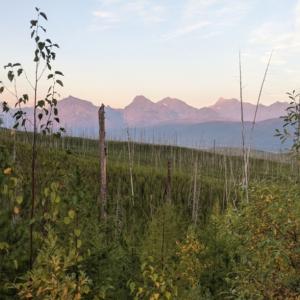Upcoming NC CASC webinar - April 13, 2023
Date
Social Science is RAD
Presenters:
Katherine Clifford (University of Colorado, Boulder)
Amanda Cravens (Forest and Rangeland Ecosystem Science Center, USGS)
Corrine Knapp (Haub School of Environment & Natural Resources, University of Wyoming)
Abstract:
This presentation explores the social factors that contribute to agency decisions about ecological transformation. Faced with global climate change and ecological transformation, natural resource managers are being forced to reconsider how they engage with stakeholders and make decisions. The resist–accept–direct (RAD) framework has emerged in response to this challenge, offering natural resource managers a simple, explicit decision framework to support action. However, RAD decisions are judgments made by people. Managers presented with the same information about future conditions often come to different decisions. In this project, we explore the factors that shape management decisions and consider implications for how we engage with stakeholders. This presentation draws on social science research on both internal factors and external factors that shape management decisions. More specifically, we explore the intersection between managers’ mental models (their understanding of a social–ecological system) and the social and institutional factors that constrain managers’ decision spaces. Exploring these factors helps managers be more self-reflective, and also highlights the importance of using public and stakeholder engagement methods that consider other forms of knowledge and the range of social, political, and economic factors that will be impacted by management decisions.
About the speakers:
Dr. Katherine Clifford
Katie is a human geographer who studies human-environment relationships in the context of environmental change. Her research blends a mix of methods, approaches, and theoretical frameworks to integrate theory and practice, aiming to engage with big questions within social science while also supporting climate adaptation, policy change, and real-world impact. She has expertise in risk and hazards, climate adaptation, political ecology, science and technology studies, environmental management, knowledge co-production, and policy analysis. Katie currently is the Social Science Lead for Western Water Assessment, a NOAA CAP/RISA team at the University of Colorado whose mission is to produce usable information to support regional climate adaptation in Colorado, Wyoming, and Utah. Katie received her B.A. at Macalester College and her masters and doctorate degrees in Geography from the University of Colorado at Boulder.
Dr. Amanda Cravens
Dr. Amanda Cravens is a Research Social Scientist at the USGS Forest and Rangeland Ecosystem Science Center. Amanda's interdisciplinary research interests include the translation of scientific information into decision making, policies and institutions that influence environmental management, and understanding the cognitive and social processes that make decision support tools work effectively. Amanda's disciplinary training includes geography, policy/institutional analysis, and the learning sciences. Her research spans resource areas, with recent and current projects focusing on decision support for coastal hazards, human dimensions of ecological drought, socioeconomic aspects of water availability, and land manager decision making in the face of ecological transformation. She is also very interested in the practice of interdisciplinary science and has served as a member of multiple working groups as well as published on the role of creativity in science.
Dr. Corrine Knapp
Corrine Noel Knapp (Corrie) is an Assistant Professor in the Haub School of Environment and Natural Resources. Prior to that, she worked at Western Colorado University in Gunnison where she had been a faculty member in the School of Environment & Sustainability and a founding member of the Masters of Environmental Management Program. Her research interests are at the confluence of climate change, conservation & livelihoods. Using a social-ecological approach, she works in climate change adaptation, local and indigenous knowledge, sense of place, and conservation innovation. Corrie has a deep commitment and passion for Western landscapes, rangelands, and the human and ecological communities that depend on them. She is interdisciplinary by training and practice and enjoys researching with communities in a transdisciplinary approach. In addition, she is interested in the theory of research and practice, how research is used in real-world applications, and how education can better prepare students to contribute meaningfully to managing complex challenges. Corrie's current projects include understanding drought decision-making by individual ranchers and rangeland organizations, exploring compound hazards and climate change related research needs in Wyoming, and assessing the equity of deliberate social-ecological transformations. In addition, she is currently serving as the Chapter Lead for the Northern Great Plains region chapter of the National Climate Assessment.


